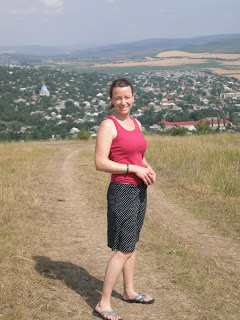Thursday, July 16, 2009
Slavic and Georghe work on Slavic's truck.
A foal trains with the horses to pull the wagon.
This past weekend, Vincent and I went to visit our future permanent site, Cahul. Cahul is a larger oras (town) in the south of Moldova. Am mers cu rutiera prin terenuri galben de multe floaria souaralui. (We went in a rutiera through yellow fields of many sun flowers.)
In Cahul we met our future Mama Gazda (host mom) and some of her family. We had cafea with the Medicul Sef (Cheif of the Medical Center) and met the Principal of the school Jess would be working with. The head of a medical center for women gave us a tour. Jess will be working at her medical center as well. We had time hanging out with Vin's future partners. All of these new colleagues we will be working with seem great. We are excited to improve our language skills to work with them even more efficiently. One of Vin's partners has produced a documentary on the orphans in Moldova. One of Jess's education partners commented that nothing is by mistake...that us in Cahul was similara cu samantsele de papadie a suflat de vant (similar to dandylion seeds blown by the wind). We are looking forward to our time there, though we will miss our current villages and host families.
To all of our wonderful youth from Eastbrook - during this somewhat rigorus and busy pre-service training, I have sometimes felt like the "camper" on a wilderness trip - or the student on a retreat. (a reversal of roles - hey) We love all of you and have such fond memories on the many trips we took together.
Friday, July 10, 2009
Gradina Mea in Casa Mea
How did this economic collapse occur? How can the Moldovan economy be reinvigorated? Jessica and I have learned much in regard to this already and no doubt it will be the topic of many of our blog entries. What i know now is that we will need the creativity, prayers and support of our communities back in the states to use their expertise in order to wrestle with the various dimensions of their struggles and potential solutions. I already have tons of questions for those of you who majored in economics, business, and environmental sciences. Jessica and I hope that we can bring the beauty and the current struggle of the Moldovan way of life into your world so that you can collaborate with us on ways to make their future successful.
Salutari Moldova!
Monday, July 6, 2009




I had my first trip to Jess host site (Bardar) last weekend. I asked my host mother is I could take a flower from the garden to Jess' host mother, when I came back from class my host mother Maria had prepared two large buquets, one for Jess and one for her host mom. Unfortunately I didn't know that it is customary to carry flowerstop down in Moldova until you present them, otherwise you may be mistaken for a man going to propose.
Here are some pics of our first true time together since we arrived. It had been a long three weeks and we finally had a chance to walk the vinyards surrounding Bardar, to talk and pray together.



We we able to go to Chisinau (the capital) last week and walk through the massive piatsa (open market). There's a really nice section where the vendors have everything nicely labled and then there are sections towards the edges where you can find a person selling their 1 ipori (rabbit) sold on the ground next to a few heads of varza.
Pumpa
Entry 2- 19 Veniri, Junie 2009
The first week felt like almost a month. The daily challenge of uncertainty, combined with the volume of language intake and the rigor of the PC training schedule made everything appear rapid and immensely slow all at the same time. I was struggling with dizzy spells all last week but they are definitely lessoning this week. It is astonishing how much language we are taking in because we have four hours of language training a day and we are living with host families. The first week was filled with tons of simple victories like successfully interacting with people in the village or using simple phrases around the house. Now that we are in the second week the expectations have stiffened due to the sheer volume of things we should know how to say (ie. verbs to have, to want to be able to…). This week however has been more frustrating because we should know how to say a variety the recall is simply not there yet. Everyday there are moments where you simply desire to give up, go to your room and shut the door--this I will not do. Below are pictures of my LTI (language trainers) and a great pgoto of the public transportatyion in Moldova , which consists of minibuses with a few seats and literally unliited capacity.






